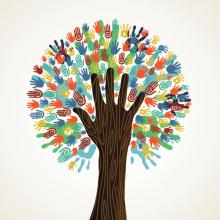creator

The Cross is an inexhaustible mystery, but among the many things it does so well is make visible the love of God.
In Jesus Christ, God is not an abstraction, concept, or idea. The Unknowable is made known. The Invisible is made material. All mysticism is now grounded, and all agnosticism now countered, in this particular Person; there is now, paradoxically, a Measure within Measurelessness.
"For in Christ lives all the fullness of God in a human body." (Col. 2:9) "For God in all his fullness was pleased to live in Christ." (Col. 1:19)
Conversely, whatever is not revealed in Jesus is not the Triune God.
Contemporary Christians (of all sorts of persuasions) tend to de-couple God from Jesus.

FOR GENERATIONS, Native North Americans and other Indigenous peoples have lived the false belief that a fulfilled relationship with their Creator through Jesus required rejecting their own culture and adopting another, European in origin. In consequence, conventional approaches to mission with Indigenous peoples in North America and around the world have produced relatively dismal outcomes.
The result has subjected Indigenous people to deep-rooted self-doubt at best, self-hatred at worst.
One of the more egregious examples of the “conventional” approach in Canada involved the church-run residential schools. Indigenous children were taken from their families, prevented from speaking their native languages, and subjected to various other forms of abuse.
Isabelle Knockwood, a survivor of church-run residential schools, observed, “I thought about how many of my former schoolmates, like Leona, Hilda, and Maimie, had died premature deaths. I wondered how many were still alive and how they were doing, how well they were coping, and if they were still carrying the burden of the past on their shoulders like I was.”
Given the countless mission efforts over the past four centuries (which in practice were targeted not so much to spiritual transformation as to social and cultural annihilation), we might conclude that Indigenous people must possess a unique spiritual intransigence to the gospel.

What would the world be like if we were all more alike?
This isn’t just a philosophical question. In many ways, we live as though we wished others were more like us. We spend time with those who are similar to us and avoid those who seem to be different. We enjoy being around those who share our viewpoint and avoid those who challenge it. We accept the parts of others that make us comfortable and ignore or reject the rest.
But what about our diversity? Do we embrace it, or do we merely tolerate it?
Over time, I’ve grown to appreciate the importance of our differentness. I’ve gotten to the point where I think of this incredible diversity — within our universe, within our human family — as one of our greatest blessings.